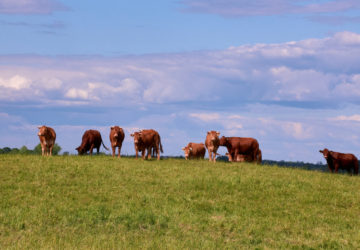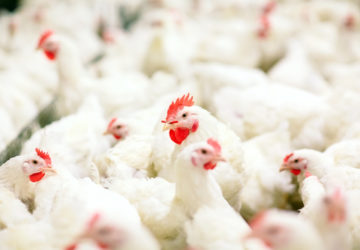 Mark Bittman, the arch-food snob of The New York Times online op-ed section, came out with another doozy of a column this week. Calling for Americans to become “heroes” in the fight against global warming by giving up–or at least eating much less–meat (a view which oddly doesn’t stop the Times from publishing Bittman’s veal recipes), Bittman notes that we’ve “already changed [our] light bulbs [by federal fiat],” so we should all join — or be joined? — together in the salad line.
Mark Bittman, the arch-food snob of The New York Times online op-ed section, came out with another doozy of a column this week. Calling for Americans to become “heroes” in the fight against global warming by giving up–or at least eating much less–meat (a view which oddly doesn’t stop the Times from publishing Bittman’s veal recipes), Bittman notes that we’ve “already changed [our] light bulbs [by federal fiat],” so we should all join — or be joined? — together in the salad line.
He stops short of proposing a federal organic beef ration, but just barely. And not surprisingly, he backs up his claim that animal agriculture is boiling us alive by citing the UN report Livestock’s Long Shadow that was thoroughly debunked by University of California-Davis researcher Frank Mitloehner. Mitloehner found that the UN report authors “charged” more tangential emissions to animal agriculture, rather than to other economic activity like driving cars — so the report’s claim that livestock were worse climate villains than anything else was a “classical apples-and-oranges analogy that truly confused the issues.”
So what’s the real picture? The Environmental Protection Agency found that animal agriculture accounts for less than four percent of American greenhouse emissions (nowhere near the 18 percent the debunked UN report proposed). All agriculture together was responsible for just six percent.
Bittman also lays the blame for deforestation on the backs of meat-eaters. There’s a small problem with that as applied to American meat: We aren’t chopping down forests to graze our animals. Bittman is applying a third-world standard to our first-world bacon.
How does modern American agriculture do relatively well? It’s not by going “organic.” A Stanford University study suggests that industrialization has made agriculture much more efficient. One of the authors even proposes, “We find that funding agricultural research ranks among the cheapest ways to prevent greenhouse-gas emissions.” You read that right: Modernizing agriculture prevents emissions by making food production more efficient, rather than causing “the absolute destruction of everything.”
Of course, when you’re an apostle of the economically illiterate local food movement like Bittman, recognizing that modernization can increase environmental friendliness would destroy your whole worldview. As long as federal regulators don’t take his mythmaking to heart, Bittman is more than free to join British organic movement leader Peter Melchett and the rest of the activists who have nothing to “go on” but “feelings.”




